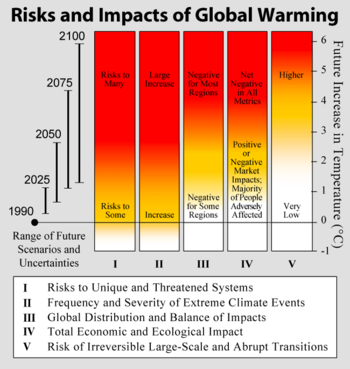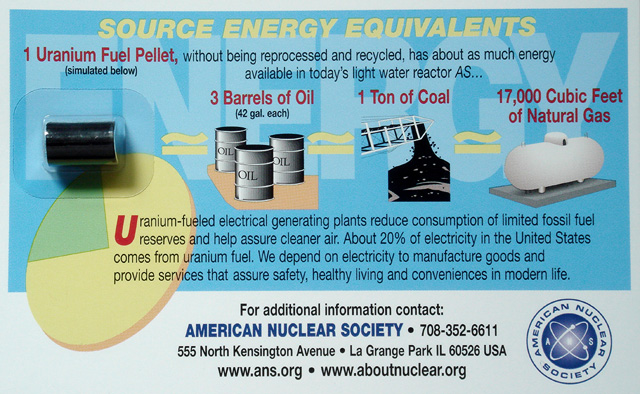
The Basics of Nuclear Energy — Why Nuclear Power?
Why is uranium mining and nuclear energy suddenly back in the news? There are several reasons. First and foremost, Global Warming, the rise in earth's temperature due to trapped greenhouse gases, is seen as not an emerging threat but as something that is occurring already with a rise in the average global air temperatures of 1.3±0.3°F in the past 100 years. The societal, environmental and economic threats of global warming to our planet are potentially enormous. Possible side effects of global warming are increased storm intensities, increasing the size of deserts, displacement of populations due to sea-level rise and desertification, conflict, increase flooding, increase disease outbreaks, changing agricultural patterns and others. Nuclear power generation doesn't produce greenhouse gases, so one source could be decreased.

Another reason that nuclear energy has become much more attractive is that it decreases our dependence on fossil fuels. The burning of fossil fuels (oil, gas and coal) emit greenhouse gases, but there is also a limited supply and we are quickly using up our reserves. Since nuclear fuel contains much more energy than a similar mass of hydrocarbons or coal, nuclear energy is an attractive alternative to carbon-based fuels. With emerging economies in India, China, and Russia, the need for more energy is straining the ability to keep up the supply for every increasing demand.
As with any solution, there are numerous positives and negatives to the issue. In particular, legacy mining issues and nuclear disasters like Chernobyl have left a public perception that nuclear energy can never be safe. Hopefully, by looking at variety of websites and literature, you can become well informed on the issues of uranium mining and nuclear energy and decide for yourself if nuclear should become part of our energy portfolio.
Here are just a few of the advantages and disadvantages with the nuclear fuel cycle:
Advantages
- Creates little or no greenhouse gases
- Doesn't use a valuable resource - hydrocarbons
- Less other pollution (for example, fly ash)
- More efficient energy source (for the same volume of fuel, it produces far more energy than carbon-based fuels)
- Reliable source of energy; reactors, with a few exceptions, spend little down time
- Cost effective when a standardized reactor design is used
- Produces little waste
- New reactor designs make it a renewable resource: breeder reactors
- Reactor technology is now well developed

Source: ANS
Disadvantages
- Safety issues and the public perceptions of nuclear energy
- Possibility of accidents: people remember Chernobyl and Three Mile Island
- Too many reactor designs (for example in the US) make training safety personnel and plant employees more difficult and emergency response problematic
- Spent fuel storage and disposal
- The amount of time it takes to get a nuclear power plant from planning to producing electricity
- High price of construction
- Mining & refining uranium can create environmental and health problems including degrading aquifers; huge tailing and mine waste issues exposed to the surface; mine, transportation and mill workers exposure to radon and uranium, and other mining related issues
- Transportation safety of nuclear wastes
- Life span of current reactors (~60 years)
- General safety issue
Links to more information
Any mention or link regarding a product, organization, company, or trade name is for information only and does not imply endorsement by the Bureau, NMT, or the State of New Mexico (see more).
- How Stuff Works
- US Nuclear
- Nuclear Power
- Intergovernmental Panel on Climate Change: Manual for Policy Makers
- Wikipedia: Global Warming
- Wikipedia: Effects of Global Warming
- RadWaste.Org
- Nuclear Tourist
- Joel McCarthy's Site
- Time for Change: Pros and Cons
- Southwest Research & Information Center
- Pro-Nuclear Sites:
- Anti-Nuclear Sites:
- For Kids & Teachers:


